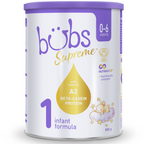How to Manage Newborn Congestion
Many new parents have had to deal with a newborn stuffy nose. It is incredibly common but can also be annoying and potentially troubling. Newborns breathe mainly through their nose and because their nasal passages are so tiny, even a small amount of mucus can make a very loud noise. A partially blocked nose is uncomfortable for anyone, but particularly for babies. There are various reasons for newborn congestion, but recognising the symptoms and causes can help you take appropriate measures to help them breathe easier.
What is newborn congestion?
Newborn congestion occurs when a tiny bit of mucus or fluid accumulates in the nose or nasal passages. While congestion is common amongst newborns, caring for and treating the symptoms properly is essential. During the early months of life, newborn babies rely primarily on their noses to breathe. Thus, a newborn with nasal congestion will find breathing more difficult than an older child or adult with nasal congestion. This is why it is important to understand and recognise the symptoms early on.
What causes newborn congestion?
There are various reasons why your baby may be experiencing nasal congestion. It could be residual fluid from delivery, irritation from the environment, reflux of milk into the nasal passage, or even a cold or infection. Since newborns are more susceptible to illness while their immune system is still developing, and an infection can become very serious in a newborn very quickly, please let your paediatrician know if your newborn is experiencing congestion. Please note that if the congestion is interfering with feeding, sleeping, or your baby has a fever (temperature of 38°C or higher), you must see your paediatrician or a health care provider, right away.
What are the symptoms of newborn nasal congestion?
Because newborns primarily breathe their nose and their nasal passages are so tiny, a small amount of mucus can make a very loud noise. Even though your baby may sound really congested, don’t let the noise bother you unless it interferes with your baby’s eating or sleeping. If the nasal congestion does interfere with your baby’s ability to eat or sleep, talk to your pediatrician.
Tips for managing newborn congestion
Once you’ve spoken with your pediatrician to determine that your newborn’s congestion is nothing more serious, here are some tips to help relieve the congestion.
- Feeding your baby in a more upright position may help ensure that the milk goes down and doesn’t reflux back up into the nasal passage
- Run a cool-mist humidifier in the room during sleep to keep the inside of the nose moist.
- Remove visible mucus by placing a drop of nasal saline or breast milk in each nostril. Your baby may cough as the saline or breast milk drips from her nose, down the back of her throat and that’s ok. Then gently suction out the mucus with a bulp syringe or nasal aspirator.
- Alternatively to suctioning, after placing a drop of nasal saline in each nostril, place your baby on their tummy for tummy time. As they move their head up and down (even if they cry), the mucus will be more likely to drain out of the nose on its own.
When to worry about baby congestion?
While nasal congestion usually is only responsible for making a baby’s breathing sound noisy, it is important to recognize true signs of trouble breathing that need to be evaluated right away by a medical professional. Here are signs of potential trouble breathing that must be evaluated right away, even if that means a trip to the Emergency Room in the middle of the night.
- Breathing is faster than one breath every second. Newborns usually breathe 30 to 60 times a minute (faster than kids or adults), but if they are consistently breathing faster than once every second, especially for 10 minutes straight or longer.
- Skin is sucking in above or below the ribs with each breath (called retractions)
- Wheezing (a high pitched whistle) or other extra noises are heart such as grunting with each breath
- Head is bobbing with every breath
- Coughing
- Nostril flaring
- Skin looks pale or blue
It is never easy when our little ones are facing a period of congestion, but it’s important to remember that this is very common. Having an understanding of symptoms to look out for and potential causes will set you up well to adequately manage it and alleviate some of the discomfort your little one may be experiencing.


